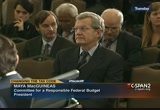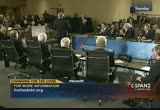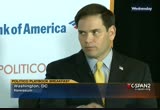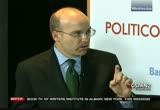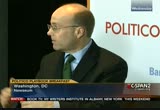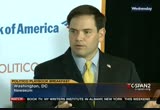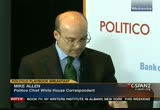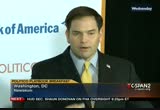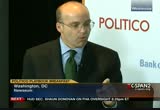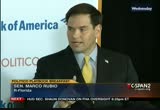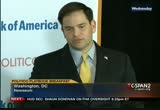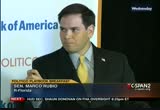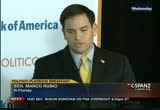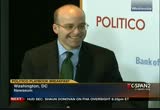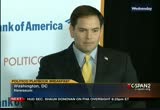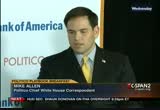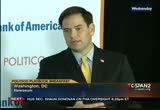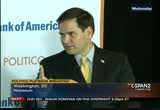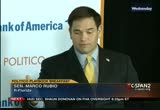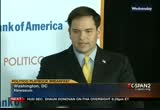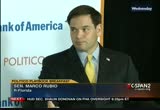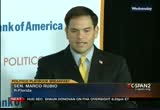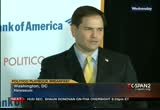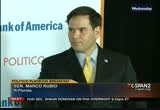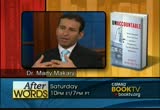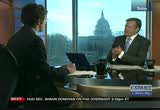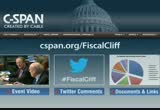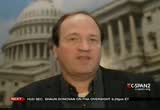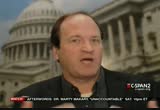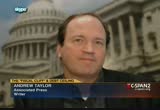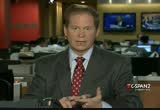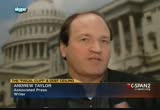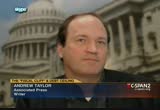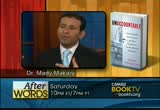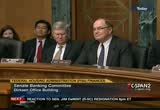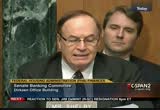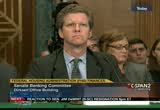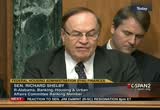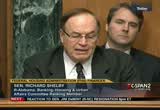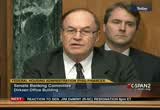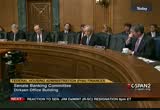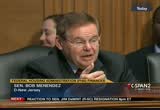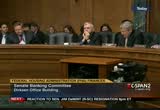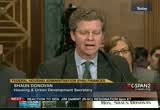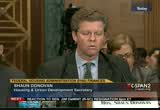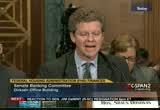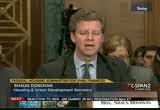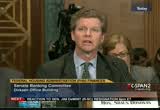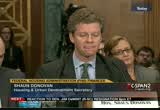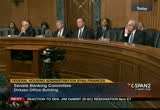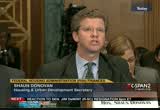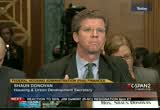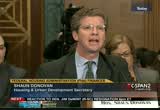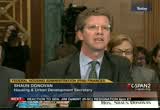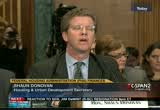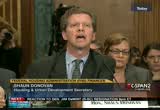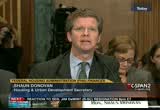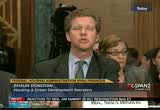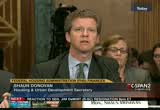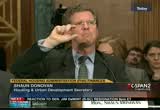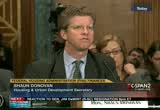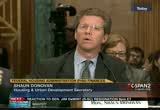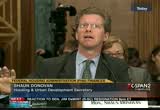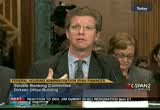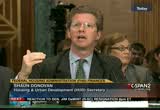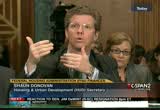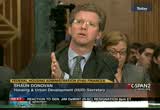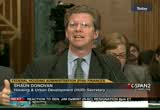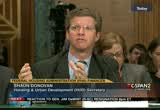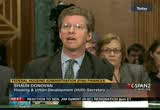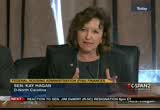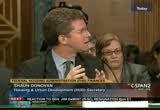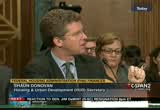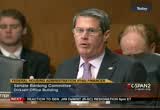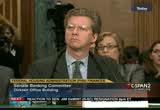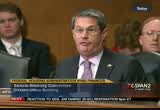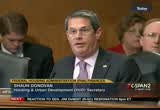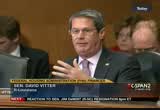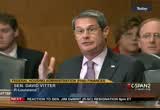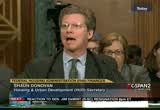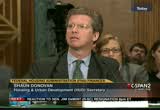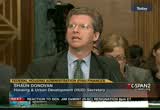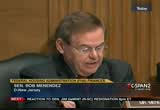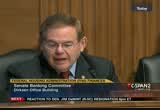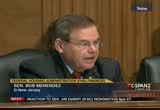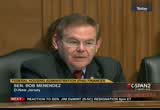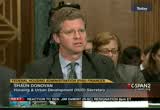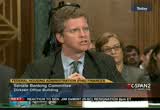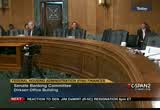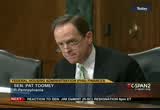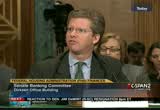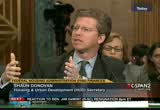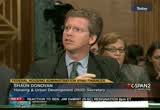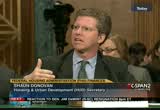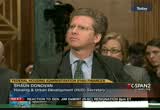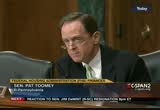tv U.S. Senate CSPAN December 6, 2012 5:00pm-8:00pm EST
5:00 pm
>> joined booktv, american history tv and c-span's local content vehicles as with behind the scenes of history and literary life of new york's capital city, albany. saturday on booktv on c-span2. and sunday at 5 p.m. on american history tv on c-span3. >> we've had these explosionexplosion s of knowledge in madison. but we have not coordinated care, and all these services that we have independent so many cracks that the cracks are as harmful as the diseases that we are treating. and you get to step back and ask, you know, are we hurting people over all? i mean come on a global level what are we doing sometimes? and, of course, now we've got these reports saying 30% of everything we do may not be necessary. step back, 30% of all the medications we prescribe, the
5:01 pm
test was order, the procedures. this is something i think which is for the first time really being called out as a problem. problem. >> dysfunction and u.s. health care industry. dr. marty makary on what hospitals won't tell you. his latest is an accountable. >> senate finance committee chair max baucus left capitol hill earlier this week to give his thoughts on what's called the fiscal cliff and negotiations that are currently underway. he spoke at an event hosted by campaign to fix the debt, a group cofounded by alan simpson and erskine bowles, the former coaches of the national commission on fiscal responsibility and reform. he spoke for about 15 minutes. >> welcome back, everybody. >> thank you. it was a traffic panel on health
5:02 pm
care. now we are really going to have a special guest. chairman baucus who is the chairman of the senate finance committee, and we will talk both about the budget negotiations that are going on now and the fiscal cliff, but what's really important is that both senator baucus and his counterpart in the house, chairman camp work together i believe on developing ideas for tax reform will be some of the lead folks who are shepherding whatever kind of framework, hopefully comes out of the fiscal cliff to their committees to help develop the details of how to do entitlement reform and tax reform. so we are very like you have with us today chairmen bockius who is somebody who's been thinking about these ideas for quite some time, hazard immense amount of expertise and will talk to us today about where the situation stands and where hopefully we will be able to move from there. thank you so much, senator. [applause]
5:03 pm
>> thank you very much, maya. thank everyone here for fix the debt, putting the fix to get conference together. this is an interesting senate. have my back to all these a luminaries here. i don't know whether there will be darts in my back or spitballs, whatever it's going to be, but it's good to be here and try to help any way i can. i first want to commend erskine bowles and senator alan simpson, retired coalition for your laserlike focus on this. you are engaging the american people, however. drawing attention to fiscal challenges that threaten our future. i know many here today are proponents to simpson-bowles plan. as you may know, i served with senator simpson and mr. bowles on a national commission for fiscal responsibility for. while i agreed with many of the proposals, there were several
5:04 pm
aspects i did not support at the time. however this report has helped advance the national dialogue. it has taken on recent importance. it should absolutely be part of our debt reduction space. i'd like to start by telling you what inhering home from a montana bosses. i'm just -- i work for all those folks in montana. a couple weeks ago i was at the montana state university football game, the biggest rivalry not only the state, it travels many parts of the country. a rivalry that dates back about 112 years. we call it the brawl of the wild. and boy, that's what it is. it's a brawl. sometimes i think that's what we should call the united states congress. more than 26,000 fans crammed into washington grizzly stadium to watch the annual battle on
5:05 pm
the gridiron. during the game, mostly during halftime when there's a break in the action, fans come up to me and say, hi, max, good to see. we start talking about football. but often turned to washington, especially the fiscal crisis. not once did someone say, don't do this, don't raise my taxes, don't count my favorite program. not once did i receive a parochial treaty request. my montana bosses told me again and again, max, just get it done. you guys need to work together. just get it done. i was really almost stunned at the unity and the intensity with which people spoke to me, get it done. now, these folks didn't ask for stalemates. they didn't ask for influx of billy. they didn't ask for our leaders to dig in over ideological things. they are pragmatic.
5:06 pm
american people want congress and the president to work together. they want us to tackle these challenges. keeping with the football theme, i want to show the words of vince lombardi, the famed actress -- packers coach wants it people to work together win. whether it be against complex football defenses, or the problem of modern society, end quote. this is a simple lesson, one we all learned as children. this is what we need to do now. stakes couldn't be higher. more than $7 trillion of tax cuts in medicare payments and programs for unemployed will expire in just 27 days am today. adding to these spending cuts and tax increases or sequestration, cuts of almost 10% of both defense and nondefense, and cuts of 2% medicare. it would be hard to find a single american not affected by these changes. you all know how serious this is. you believe, like me, that we
5:07 pm
can do it. to prevent fiscal crisis. but the answer is not just extend all of these tax cuts and delight all of these cuts. that is not the answer. this is an opportunity, an opportunity to commit to balance plan, to bring our national debt back down to sustainable levels. the united states, i believe come is at a critical juncture. we can come together, show the world we are still responsible actors. we can prove that america is still the leader of a global economy. people are watching. do we still have it. or, we can let a instruction is an and stagnation turn this country that we all love so much into a second place state. i spent a few days last fall meeting with the european leaders as they are about a week meeting of finance ministers, head of european commission, anybody can talk to try to get
5:08 pm
europe, both countries, as well as germany and finland, each with different points of view. also all the common view, they've got to find a way to work out all their differences to save the hero. and i believe they will. you can just see it, feel it, read between the lines, they are going to find a way. they will muddle through but they will find a way to get it done. these countries are also looking to us to be. and we need to lead. europe shows us the danger of uncertainty. we know the uncertainty just in this country. uncertainty leads businesses sitting at the sidelines. drags down investment economy, human capital, companies will postpone decisions next quarter. maybe the following quarter, not higher. now if you like to do a special
5:09 pm
with all that cash. we can keep people wondering what's coming down the pipe every three months. confidence matters. it especially matters in our economy. once we've resolved the cliff, we need long-term fiscal reduction so businesses can plan for the future. to get families and businesses certain we must agree the next few weeks on specific spending cuts and specific revenue increases that reduced the deficit to avoid the fiscal cliff. we should not put off hard decisions of gimmicks or with triggers. that's what got us here in the first place. it's time to bite the bullet and make the tough decisions and make them now. the first thing we should do is immediately and permanently extend a middle-class tax cut. this will provide needed certainty to america's families and businesses and markets. this decisive action will ensure that millions of american families don't see attacks like of more than $2000 starting next
5:10 pm
month. in year-end agreement must also have a long-term extension of the debt ceiling. america cannot afford another debilitating to school showdown. it has to be a package deal. then we need to enact a long-term and comprehensive deficit solution. most serious plans recommend about $4 trillion deficit reduction over 10 years to restore fiscal balance. the budget control act banks about 1 billion. bringing our troops home from iraq and afghanistan saves another 800 billion. that's real savings. it should be counted. interest savings provide another 600 billion. there's no reason we can't come together to find at least 2 trillion of additional deficit reduction giving us 24 trillion. this plan will strengthen the economy, put us on stable path forward. and have much ramp up overtime to avoid slowing down the economic recovery.
5:11 pm
40% of the long-term growth of federal health programs is due to rising health care costs generally. 40%. 60% is due to americans aging. in fact each and every day 10,000 americans turn 65, every day. 10,000 americans enter medicare, turn 65. as chairman of the finance committee, i have influenced a lot of policies but they can't keep folks from getting older. we need to focus on what we can influence, and that's overall health care costs. shifting costs to seniors is not the solution. we cannot break the promise of medicare and social security. that's wrong. we cannot break that promise. i was proud to help craft affordable care act. we did major steps to slow the growth of health care spending, and strengthen both medicare and medicaid. but there's still more to do. this this morning's panel focus
5:12 pm
on reforming health care spending. this is critical. but we need to focus on facts. if you turn on any television during the campaign season, you likely saw fix it, attack after attack ad. claiming billions of cuts to medicare, including putting millions of america's seniors at risk. nothing could be further from the truth. there's zero cuts to medicare beneficiaries in the affordable care act, zero. these ads are the exact types of ms. living political attacks. both parties are certainly guilty. i'll be the first to admit that no one will be able to come together on these tough decisions if and when we do, if used as red-hot issues to brand each other. there will be no winners and both sides continue these kinds of fights. you rise and fall as one nation. right now crippling levels of debt are choking off economic vitality.
5:13 pm
it threatens our economy and her children at her grandchildren's prosperity. the debt to gdp ratio is currently 73%, highest since world war ii, and growing. but over the past two years, revenues as a share of gdp have shrunk to the lowest they have been since world war ii. as more and more baby boomers retire, it's simply a fact we need revenues above historical averages to deal with this demographic reality. we are simply not raising enough revenue. we need real significant new revenue this month. this month. once that raven is locked in, we can then turn to overhauling the tax code for modern economy. i'm committed to tax reform. i could have no better partner with this mission and my good friend chairman of the ways and means committee it can't. i've been developing a plan that will help create jobs, sparked
5:14 pm
innovation, stand opportunity. we have a lot of work to do. a short it might -- a short amount of time but i'm optimistic. we can restore confidence in america, a balanced solution will provide america a fiscal course correction. and when we reach a meaningful deal, and i'm confident that we will, every credit rating agency will have to restore america's aaa rating. there are good people on the other side of the aisle. my colleague, senator hatch, recognize this business of the challenges. working together, we can get this done. working together, we can restore america's economic vitality. so i'll conclude where i began, taking you back to the football game, montana. at the end of the brawl of the wild, the final whistle blew, players from opposing teams gathered at midfield to shake hands. they had just beaten each other to a pulp in the frozen ground for the past "60 minutes."
5:15 pm
yet, the end of a game, they could come together and they did. the thousands of fans who spent the weekend left the stadium not as a bobcat, not as a grisly, but as montanans, as americans. this is the spirit we need now. come together to resolve the fiscal crisis, only way forward. now is the time to get to work. before i finished my final sentence, thank you and happy holidays, i'm just a matter of something, remind myself of, say it on occasion, something i believe, and that is all of us, everybody in this room, all of us in congress, all of us who aspire to positions of leadership, have the public trust, even those of us who are not in public position, all of us have a moral responsibility. when we leave this place, we leave it in as good a shape our better shape than we found it.
5:16 pm
all of us. and if we follow that moral obligation, not only will we be helping our kids and grandkids, more important we'll be helping ourselves we would be doing the right thing. we all have the moral obligation. to leave this place. we are not here forever. we're here just a short time. we do leave it completed in as good shape for better shape than we found it. thank you very much. [applause] >> florida center mark arabia joined politico's chief white house correspondent mike allen at a "playbook breakfast" discussion on current politics and policies. this interview is about 45 minutes. >> thank you so much. a late-night. >> not really. >> is bob still here? what would you like to ask
5:17 pm
senator rubio? [laughter] >> are you still doing this shit? [laughter] spent ask him a real question. i decline. [laughter] >> okay. last night talked about a new direction. one of the things that you talk about is -- [inaudible] and how to mike higher education in how to reform programs be the number one thing you would do, you can do as a freshman minority speakers i don't think there's a number one thing. there's a number of things. we got to get them all. the biggest obstacle we face in the 21st century doesn't look like the 21st century. not just in a jewel to graduate high school. still continues to be a significant part of folks that are going into college but it's also the 38 year old who decided to go back to school and get a degree. that was my sister. it's also the 25 year old that's
5:18 pm
after 10 years of being out of high school has been stuck in a service area jobs and deciding they want to empower themselves to that greatness is that technological advance our not only going to lower the time and costs of getting that kind of skill acquisition but are going to make it much more accessible. we have to make sure it is her student aid programs don't stand in whether. let me give you an example. right now what we have is student aid like pell aid like pell grants or the loan programs, they have credit institutions. they don't have credit courses. so that is a way towards conditional for your land grant university, nothing wrong with it. i went to a school that is about -- to be crushed by the sugar bowl. anyway, a few points of mitch mcconnell. but what about the folks that don't want to do that and can't do that? they want to take a course, online course fiscal year an online credit the school over you. we should credit courses so we're not discriminating against
5:19 pm
allowing people to us acquire skills in that setting. i think we have to reform our loan programs to reflect the 21st century students. the second thing i would do is make sure we have more information. that's what i spotted the right to know before you go act. before you take out his welcome students will be given information about just how long it'll take you graduate, this is how much you can expect to make if you graduate with this degree, and this is how much you will have to go in student loans. if you still want to get their philosophy major, that's fine, but it doesn't a lot of money and you will '01 hundred 50 grand. >> we have not heard republicans talk much about this. the weekend governor bobby jindal said republicans needs to stop being stupid party. spent i don't know about that. i think the challenge for the conservative, the challenger every movement in american politics is to apply your principles, that as a conservative i think are proven by time in history. apply this principle to the 21st century.
5:20 pm
we applied into the 20 session but now have to plug into the 21st century. so for me, like everybody we came from somewhere, we bring without expense. i graduated college with about $150,000 of student loans, between, you know, law school in undergrad. it was a combination of pell grants, stafford loans instant loans which i said last that i paid with the proceeds of my book, which is perfect for the holidays. available on amazon now. anyway, but i never would've been able to go to school without. it's that simple but if it wasn't pell grants and wasn't student loan programs i would not be a college graduate speak in your speech last that you talked about how fortunate we are to be where we are, who we are if you talk to how but for an accident, you in your dancing shoes. you pointed out you would probably be a very opinionated bartender. >> right. you think about my parents came to this country they were about
5:21 pm
to the unskilled and uneducated. by dad went to the fourth or something like that. my mom, not much more. they grew up -- they move to the united states in the 20 session. they were able to find jobs. they could own a house, a car, take vacations. we never had everything we wanted but we had more than what we need. that's an attempt to the miracle of the american middle class. i understand that being raised by parents like that somewhere else would have meant, would not admit what it meant you. i would have gone as far. would be stuck somewhere else. >> you have more than you needed, but kids, did you realize that at the time? >> as a kid you don't realize things. what i always realize, i think i give my parents great credit for this is dave from the very beginning just really drilled into me, there wasn't anything we could do. there's a limit so far you can do. we have some limits because we got to kind of late. we don't know the language as was when you come we don't have the skills. but you guys getting a lot.
5:22 pm
there's no reason why can't. i can't tell you how important it is to not only have dreams, but to believe the stranger possibly if i worry about anything is, either are dreaming or believe the strings aren't accessible to them. because of the circumstances they're going up in. have to deal with it somehow. >> politico's coverage of speech last night pointed out something was missing in your speech. didn't mention mitt romney doing to through ago was your, as a party, is, mitt romney going to disappear or does he have a role speak as i hope is not going to disappear and hope he does have a role. personal, very few people have done what he's done, run for president, be the nominee of the party. >> and got crushed steadfast action. he got 47, all of the votes. the truth is you want a lot of cities but he didn't lose 49 to
5:23 pm
one. he won places. he has a lot of supporters. so i think, what is also been successful in life. if you look, i told him this, mitt romney is a role model as a person. as a father, as has been, as a leader. i think he has a lot to offer the republican party and their country. i don't know what the role is going to be but i'm excited to see what it's going to be. i think he has a lot to continue to offer spent one of the issues you will talk about in the coming year is immigration. the big enchilada it's been called is immigration reform, the pathway to citizenship. yes or no, does that get done? >> i hope so. i'm really hopeful we can deal with the issue of immigration. now, i they can needs to be dealt with comprehensively i'm not in a comprehensive bill. the reason why that's important because each of these issues -- deserve to be dealt with squarely for what they are. i think there's consensus on almost all of us. at the we can reach consensus on border and structure and e-verify, on modernizing our
5:24 pm
immigration, particularly as it applies to occupy in other words, high-tech professions it i think would develop a strong consensus about ag workers and guestworker programs. >> those are all the easy things spent they are not easy. there are intraparty debates on those. some sort of alternative act that allows us to accommodate these kids without encouraging them to -- if you do all those things are still left with a lot of people still undocumented. my point is it's going to be a lot easier, a lot easier both politically and from a policy perspective to deal with those folks that are here undocument undocumented. there will be less of them so they'll be able to avail themselves of the guestworker program or the alternative to the d.r.e.a.m. act or reform legal immigration system. the american people say you did either by, you did for security so now the problem is going to happen again. now we can do what we've always done, be the most passionate
5:25 pm
people in the world and view this what it is. so i am optimistic. we can depoliticize this issue and solve. i think there's as much opportunity to do that now as there's ever been, i'm hoping a from what i followed up that i hope because we've got to deal with it. not for political purposes, for america's purposes. this country doesn't have a 21st century immigration. it cannot be what it is destined to be which is the single greatest nation. >> a few days after the election when republicans lifted -- mitt romney with hispanic voters, something like a 44-point gap. we need to do something on immigration. but it wasn't a couple weeks. republicans already couldn't agree on what needs to be done. how do you get your own party on the same page, let alone with the democrats did was i disagree
5:26 pm
but i don't think that's what's happened. i think what's happening is, the concept of immigration reform, and a lot of consensus. like every major piece of legislation to need to be examined. i'll give you an example. we have millions waiting to come in legally. a lot of encouragement office. they say we've done it the right way, we've waited. you were telling me that somehow if i can elegantly it would have been faster? it doesn't seem rights of people are troubled by the. that's one example of the kind of debate i think we're going to have. on the ag worker, ma guestworker, there will be a lot of debate in the democratic party. they are our labor workers who are not in favor of a guestworker program. they will have a debate about -- this'll take a while. there's no magic solution or it would've been done done a long time ago but we have to do. i believe we can do it. >> my question on this, for use of now, what is the likelihood that congress passed some pathway to citizenship?
5:27 pm
>> i think it's more than 50/50. i hope i'm not being overly optimistic. i certainly -- [inaudible] quicker than others. but my hope is for the good of the country we will have dealt with that issue. >> i brought along an old friend. this is from 2006 when you were florida official, 100 innovative ideas. a lot of these i think, you're still talking about the one, promises. you said we should make these people life without -- you said that you favored life without exception. of course, sexual predator. one of the issues you talked about is trafficking -- sexual exploitation why has the trendy been so slow?
5:28 pm
>> it hard to believe we have a domestic problem. for us, human trafficking and slavery is something else going on summer uzbek it's hard for people to accept it's happening right here. sex trafficking is a horrific thing and there's a lot of in the trendy. but there's also labor trafficking. america has more people in a category. we shouldn't overlook the fact that people being held here in this country is basically indentured service. we're to do with that as well. it's a big problem spent what's the biggest single thing you think should be done to alleviate child -- >> personal, people have to believe that this exist. there's scientific, sometimes we ignore. one of the things we saw in south florida, training folks at the entry point, customs to spot. there are signs, profiles of human trafficking. the awareness part of it is important to craft a place take especially these young women when they are -- a lot of them find themselves in prostitution
5:29 pm
and then they get treated like perpetrators as oppose to evict them. the psychology of someone who was forced into a life of prostitution initially is the psychology of the perpetrator but, in fact, we have to get law enforcement and our judicial system to treat these young women as victims, put them in setting what they can pull themselves away from drug addiction or whatever else that is used to keep them trapped. >> i'm going to ask you a couple twitter questions have come in while we been talking. one of them is, who's the best in washington, d.c.? >> robert griffin the third. [laughter] >> why did the majority of americans reject the republican party? >> i think it was an election. it was a very close election but if you look at the numbers, but i think the republican party would do a better job of -- a limited government, free enterprise. we need to improve on the way we
5:30 pm
connect those policies to everyday lives of everyday people spent why has there been a failure? >> i'm not sure there's one issue for it but i'm not sure there's one reason for and i haven't had time to think about why this. but it needs to happen because i truly believe that principles we stand for are the only way, free enterprise limited government is the only way for us to stabilize and grow our middle class which is what we hope every american does. >> how worried are you of the consequences of the republican party -- [inaudible] >> i don't know about, even from the voters perspective? you mean changes in the demographic changes? you know, i'm not, i do think any voter in america, the our voters are locked into one party or the other, but the fastest-growing group of voters our voters are not in parties. what your looking for people who understand the issues ending anxieties they hope in the hopes they have. offer real and concrete policy solutions and a real role for government, appropriate role for government to play in addressing
5:31 pm
those anxieties. i think we're one election away from being able to do that. would always our but we have to do. we have to recognize what it is and concentrate. >> how much of a danger to the public is being proposed by this change is? >> i wouldn't call it a danger to i think it's a challenge. it's a challenge. like every election is a challenge. take what you stand for and tried to convince people that it's better for them to what the other side is offering. sometimes people have forgotten the article of persuasion. politics is not just being what people are for. sometimes politics should be but and oftentimes it should be but understand what is the right thing for the country and working hard to convince people that that is the right thing for country. that's an important part of the political process. it has gotten lost recently. [inaudible] >> look, there are a large number of hispanics will also happen to be liberal democrats. there's nothing wrong in trying to do to change it. there is a significant number of
5:32 pm
hispanic voters that vote the canada, not the party. but i think there's a lot of things that happened before even the ticket came together that hurt our option. unfortunately, the republican party for many years, a lot of positions as the anti-illegal immigration for. certainly are against legal immigration of most americans are. what we need to be as pro-legal immigration. [inaudible] spent by being it. by putting up controls -- concrete proposals. we understand the legal immigration, not just is an important part of our heritage but important part of her future. and i understand that when you talk about illegal immigration, you are not talk about -- you're talking to real human beings who are here for the same reasons that people have always come here, because they cannot read a family a a better life where
5:33 pm
they live and there's a country where they can't and so that's what ago. that's the reality. deserve as human beings. that's what such a big issue in the hispanic community because not just -- you know somebody who was living under the circumstance and your heart breaks for them, even if you know that what they've done is legally wrong. morally, you feel for them because you recognize by the grace of god that could be you. >> we did a column this week, behind the kurds. before that, your adviser said you didn't want to be pigeonholed as a hispanic canada you want to be known as a conservative oriented. ethnicity does matter. it's a big part of -- do you feel pressure in that a? >> no, i don't at first on at the don't want to be the hispanic canada%. i come from where i come from. and he deeply influences what am everyday of my life. i grew up in a family that face certain struggles and
5:34 pm
circumstance. i still the very day in the neighborhood of people whose lives are the kinds of things that help government policy will do. and i deeply influenced by the. there's no way to escape that. i know people struggle with immigration issues. i'm deeply influenced by the. i think that applies to a broad swath of americans. the issue the hispanic committee faces are not that different from everyday americans pick families are getting ready to take kids to school this morning and what they're worried about is what my parents used to worry about, and that is how are going to make bills this month. how we give these kids a chance to better the we we did? i think that's a political movement that can best identify concrete government to address the ones that are going to -- >> given party operatives and what party officials speak, think the way, how do you avoid being -- [inaudible] >> i don't worry about. i am going to my name is marco rubio. i don't intend to change that.
5:35 pm
i come from working for. i'm proud to mark him from. doesn't make him better than anyone else. doesn't make me more qualified anybody else. it just makes me like them. i'm going to show that not for ethnic purpose, but foreign policy purpose. it allows me to relate and hopefully, i think, apply public policy. why do i care about programs for student loans? because i wouldn't be able to gone to college without the. i think that's good. that's a good thing. that's why we have the representatives for the public. >> senator, you have said, i heard you say that actually, yeah, communities quite conservative social issues, fiscally, as is the african-american community in a lot of ways. both communities projected your party -- rejected your party. beyond immigration reforms, what kind of policy should the party
5:36 pm
put forth? like for instance, there was a lot of talk during the campaign about children of immigrants. what else can they offer? can you get that by the right lines of our? >> first of all i think the issues that appeal to minorities at the same that appeal to everybody else. there are two things -- what's the number of an issue that hovers over us? that's growing opportunity gaps between hopes and dreams of many of our people have and the chance to publish it, particularly to be able to get to that class that my church were able to get into. what are the impediments? number one we have an economy that is creating half of those middle-class jobs and number two we have a lot of people who do not have the skills. there's a disproportionate number of minorities involved in that category for a lot of reasons. it starts with access to
5:37 pm
education. and how impossible it would've been for me or any of my siblings to go to college if there weren't pell grants, student loans. secondly, is the social reality, social changes. we can't separate economic well being over social well being. one of the leading causes of lack of preparedness is the fact preparedness is a factor in many and kids in america that are growing up in very difficult circumstances, raised by heroic parents, sometimes a grandmother, a dangerous neighborhood in substandard housing with poor nutrition, no access to private health care in schools benefiting. those kids are going to struggle. they don't go to afterschool activities because the parents can't afford the fees and they can't get out of work and time to take them. there's some heroic single parents out there who have done some amazing things and they will be the first was to tell you, it is hard. and yet we can't -- if we don't address it. government can have or will but ultimately civil society has a bigger welcome which is we should support the.
5:38 pm
we have to recognize and talk about it. maybe we have done enough of that to look at the free enterprise moving. i don't think that's a way to appeal to minority voters. i think that's way to go for country. we can move ahead without them. >> we are going to click die for a second. first, i think we have a special guest year. >> yeah, my wife is a. i do know where she is. today is her birthday. >> welcome, happy birthday. [applause] >> isn't as romantic? >> they wanted to know if it was a vampire. that's a different movie. >> the fiscal cliff. yesterday abc wrote republican doomsday snow. doomsday scenario was that you vote for the senate bill extended bush tax cuts 4908% of the people. say that's it, no more. "the new york times" today, it's
5:39 pm
a fallback position. specters well i don't want to -- apocalyptics have because i am confident there's enough people, a majority of people in this town to extend what we're doing here, with playing chicken with is the most important country in the world. we are on the verge of doing some significant things. to this enormous an extraordinary country. i don't think anyone wants to be part of the republic. that being said, before we talk about fiscal cliff, we'll get because the last fiscal cliff. we had another fiscal cliff types of new with the debt limit to create a center that led to this ridiculous idea that i voted against that let's put a bunch of bad things to happen at one time because that will force washington to do something. surprise, it didn't work. here we are again. so we have to issues. number one is an immediate term to avoid doing damage. that's to avoid doing harm. so we need to look for a way to accomplish that in the short
5:40 pm
term. then we have had a conversation about getting the fiscal house in order it's just fundamentally true. we spend a trillion dollars a year more than we take in to assist attack. i approached this issue that the only way we can get that in order is to rapid economic growth. there's no taxes to raise. what the presidential post does not raise enough revenue, but it will make a dent on job creation, particularly middle-class job creation. so that's why i oppose this blanket instead i think we should do real tax reform. if there are loopholes, there's a loophole for being able to write off your yacht of your second home in interest. let's go after things like that but not as a revenue-generating mechanism, although i do believe we need more revenue. the way you generate more revenue is to rapid economic growth. is the only way to generate the kind of revenue unique. >> what are the circumstances of which you would vote for a tax
5:41 pm
freeze for the top speakers i do think that's a solution. it's not a pledge. i just think the number issue is grow the economy. it's not about taxes higher auto. it's about growing the economy and create jobs. i believe that proposal her job creation. here's why. the true millionaires and billionaires have the best accounts employers in america do whatever you want with the tax code, these guys will maximize it. people who get crushed is the small corporation owner who cannot afford to do all this in the tax code and instead getting creamed. so when their taxes go up they've got to get the money from somewhere. here's the three things they can do. they can either raise their prices, which is bad for consumers. they can cut back on infrastructure investment which is bad for manufacturing. or they can lay off workers, katherine austin the height of the none of those are good for our economy. it's not about a pledge. it's about growth. this stuff hurts growth. the president has a tax increase to help grow the economy but i'm interested to hear about it. >> you would vote against the
5:42 pm
fallback plan, spending and tax cuts speedy's i will vote against any plan that hurts us. i think growth is our only solution. >> that is an answer. i'm not voting for anything that hurts growth. >> do you think were more likely to have -- do you think we go over the cliff speak with i think something will happen, i do. there's just too much at stake. i think something will happen. >> what can be done? >> i just know, i know these guys. when the cameras are off, people are not just senators on television. people get it. we get. hopefully we'll get there in the short term. >> a deal by chris the? >> i hope so. i'm optimistic.
5:43 pm
>> your answer to the question from g2, how old speed let me to answer to pick the adjective was actually trying to make the same point the president made a few years ago. and that is the is a scientific debate. four and a half billion. i was referring to a theological debate which is a pretty healthy debate. a theological debate is this. i'm not theologian either but the theological -- >> just set the table. you began your answer by saying i'm not a scientist spending it right. i'm not a position to center is any kind of debate scientifically i'm not in a position to really media that. but on the theological debate, theological debate is how you reconcile with science definitively established with what you may think -- for me when it comes to the age of the earth there is a concept a i believe god created the heavens and earth. i think the scientific advances have allowed us to have given us
5:44 pm
insight into when he did and how did you but i still believe god did. that's the i been able to reconcile that. other people have a keeper -- i think in america we should have the freedom to teach our children whatever it is we believe. that means teaching them size. they have to know the science but also parents have the right to have theology and reconcile that. as they believe in secret. i think that's the point the president was making. back in 2007 when he was asked that question. that's what i was saying. >> we will accept it in the context. >> our faith, my faith says god created the universe. he created the beginning out of nothing. god created the heaven and the earth's. scientists have decided we needed and how he did it. the more sides learned, the more i'm convinced that god created it.
5:45 pm
[inaudible] >> later returned to the catholic church. spin maybe i am a theologian. >> now i think you go to mass and attend services. >> i'm a roman catholic. i'm 100% accept the church's teaching and the churches teaching authorities. in addition to that we interact with intercontinental a church in south florida which is a phenomenal teacher of the written word. >> pastor? >> rick. it's not much different than roman catholics who like billy graham's sermons. i have grown in my faith with what i've learned. i am a roman catholic and support one of% the authority of the church. i have a deep appreciation for
5:46 pm
our love of christ can bring hundreds of thousands of people to salvation. there's a lot of people i know that actually do that. it's kind of a big deal. in the real world, a lot of people said yes, i -- i just think it has enriched as. >> you can never have enough god. [laughter] >> as you go forth and maybe a national candidacy, you will be asked a lot of questions. here's one. [inaudible] >> i think science has established that pretty well. human egg becomes a human into becomes a human life. i wish there were more focus on deeply committed science and
5:47 pm
belief in science that would not ignore the scientific fact. they are pretty brave about saying the age of the earth but they don't want to say when life begins. life begins at conception. [inaudible] >> first of all i think it caused a ruckus in that group, like not a single person in the supermarket asked me about it the day before. look, i love -- >> there is a world of bloggers to? >> and be in washington by the way. so let me just say this to you. i'm fine with it. i think it's good. if i say something that triggers conversation and allows me the opportunity to talk further about things i believe, i'm happy with that. >> you regret your answer to g2? >> i don't regret that i wish i would have given a better answer, a more specific answer. we went from talking about hip-hop and then he pivoted to
5:48 pm
earth. i'm not a robot. it got me off guard. that's what i was try to make. i thought i made it stick you were a little irritated. >> i wasn't actually. i thought i was making the point. if i 30 minutes to sit and type of it would have been different. but that's fine. spent another hard question to some extent i can tell you -- that's what the bible teaches. that's what faith teaches but it also teaches there's others that are no less. it teaches that disrespecting your parents, the ceiling is a sin to soda is a person in this room who isn't guilty of sin. i don't go around pointing fingers. i am responsible for my salvation and am responsible for my families. they will become adults and
5:49 pm
decide how they want to apply that in life. as a policymaker i will tell you i'm informed by my faith and my faith enforcing qam. but not as a way to -- [inaudible] >> you are reading -- what are you going from? >> for so i think it's confirming a lot about the challenges there are. the conflict in afghanistan. there's a direct conflict in making sure it's not a save some for the taliban but internally, lack of a better term, tribal rivalries, but sometimes the u.s. has cooperation, one group of people creates resentment among others. they want to redevelop their neighborhoods. atg this very strange dynamic but it also gives you insight into the impact of history is having in the area because this is a part of the world that has been used to being conquered
5:50 pm
thousands of years coming and going. apart from human tragedy, your heart breaks when you read about someone who just had a baby a few days early, spoke to his wife regularly on a mission and the helicopter crash. your heart breaks. it reminds you of the human cost efforts to that also reminds us of the logistical challenge. >> did the book make you regret your comment on afghanistan speaks no. i think it reminds us of the challenges. at the end of the day afghanistan is important to it's important for multiple reasons. you don't want to create a safe haven in afghanistan for people to be able to come back from the taliban and -- it's also about pakistan. to have an unstable afghanistan were radical islamists are organized is a danger to pakistan and its nuclear
5:51 pm
capability. they are concerned about that as well. i think the future of afghanistan matters in terms of regional stability. i think that's why i'm cautious about the way we engage because if we disengage on a counterproductive way it's going to lead to greater chaos, and perhaps even setbacks. all the lives have been lost in all the blood has been shed and all the treasure spent would become. >> what do you make of president obama's? >> i don't know president obama will. i spoke to him a few times. he was gracious in the to call when my daughter was injured a few sica. as did the vice president. spent your 12 year old daughter, how she? >> she's doing great. but let me just say i have deep admiration for the way he's able to balance out the be the hardest job in the world with the most important job, father and husband. i think the man is a role model.
5:52 pm
i have deep policy disagreements with the president. that's why i'm grateful we have a republic spent what have you learned from the way he handled his role as a father? >> i think he's done a great job as i think the clintons did, and raising two young girls. under very intense bubble, for himself personally but also the with gigabytes of his time. from what i've read he's never missed a parent teacher conference. if the president of the nfa of the net states and never misses a parent teacher conference, none of us should either. [inaudible] >> i've never said that. what i said is there is no parallel between fidel castro and barack obama or any american politician. fidel castro has never been elected to anything. never run for office. that's not anytime what i've ever said. i can tell you i don't parallel between places of government dominate the economy.
5:53 pm
but cuba goes well beyond the. cuba is not just about government dominate the economy. cuba is about getting beat up on the side of the churchhe has you dare to speak out against the government. that doesn't happen you. so i'm not anyway drawing parallels. [inaudible] >> i don't know if that's a way to put it. i think our future economic options have been diminished by some of the choices made by the president, by his party. i'll give you a real world example. i am a federal employee, and blessed to have a chance of having a federal savings account. i wish more americans had his. i use it to pay my copayment when i take my kids to the hospital, like when have an accident on a golf cart, or pay for orthodontic care. under obamacare i can under obamacare i can do is to be able to say $5000 a year i a year i can only save $2500 a year. and that if i want to buy ads
5:54 pm
are, they tighten up my daughters braces and she's and then, i've got to get a doctor's prescription to buy an over-the-counter prescription. that's ridiculous. that's a dumb thing. and yet that's the law of the land. that i think has been counterproductive. i hope we can change that. >> the you think we are -- >> i think we're going to be less prosperous as long as the government is continued in the direction it is going out. the biggest bomb is there is no long-term solution for long-term debt problem. they are afraid the longer this goes, the higher the likelihood -- massive tax increases. 20 years ago we made it more flexibility in that regard. now there are a lot of countries that open and fully to business, and increasingly unfortunate firms are finding out they would rather. but they would just invest somewhere else but where they would rather be. we need to make sure they stay here or come back.
5:55 pm
[inaudible] we were told you was the next couple years working on legislative, on your middle-class agenda is, immigration. spent by the way, that's the job of a senator. i don't know if that's newsworthy. >> after midterm elections, after that, you make a decision whether to run for president. [inaudible] >> to be honest with you about that, i enjoy public service and i want, i know this is the answer to give, but i want to know how long i can be in public service but i enjoy public service. i think what i as a person and everyone as i pushed with 16 is a want to continue innocent but if there's some of opportunity as a form, or don't want to return to the private sector and give so else a shot? there's a lot of factors go into the. part of it is what you feel a calling. was the fuel the fire to do. part of it is whether your family is with you.
5:56 pm
for use in all of my kids will be four years old at some of the the teenage years. that's what i stand are pretty challenging times. so all these things are real factors that go into account. part of it is if you have something to say. because i think he will do things like that if you have something to say. [inaudible] >> here's the point, what i would say to you is i have a job now. the best thing i can do is to the best they can at the job i have no. because what i've learned from watching others is that if you do a good job after job, you always have other options. sometimes they are unexpected. i never thought i would be a syndicate kind of had any ambition for federal law. but that opportunity presented itself partially as a result of -- who were able to accomplish when our speaker of the florida house but i think that same sense of loss but so who knows, i may be the commission of the nfl but i keep putting that out
5:57 pm
in hopes someone will say, maybe we should interview him. [inaudible] spent is a competitive process. >> are you likely to run for president? >> i just don't know. right now what i should focus on is moving forward on public policy, and in a few years i will have an opportunity to decide what i want to run for reelection, run for something else. or go home and give someone else a shot. spent about to get the hokey. the penultimate question. why didn't it rendezvous? >> i think florida was a very competitive state. just a political observer, genius of obama turnout machine to i can tell you there's a restaurant they are the we go to, catholic church, right next to it is a storefront, obama organizing for america. there in the 12, 14 months before the election. what could they possibly be
5:58 pm
doing? and so -- >> they were registering voters spent they were registering voters, identifying voters. i have admiration for the do. that's what we should do. on the other hand, i think from, other for the say people are very anxious, and particularly about the opportunity to stay in the class or get to the middle class. for whatever reason at the end of the day, which is as a movement. our ideas with the right ideas for those impatient and that so we need to do better at. >> what can republicans learned from obama? >> look, whoever has the high ground on technology is going to win. it's just a fact. we can never let that happen. you want to make sure for a technological point, you are state-of-the-art. and communicating your message, identifying people, ensuring
5:59 pm
6:00 pm
change with devices to you carry? >> devices? i use an iphone. not and ipad. >> you are handy with that. >> i have an iphone. i use an iphone and i have -- still holding on to my ipad. the iphone, i use and ipad. en iphone. >> last question, you wear a lot of hats. >> defensive coach, first round of the playoffs, didn't give a path. neither was one attempted. to be fair. it was a tremendous great time, my 7-year-old's first time playing tackle football. ahead as much as i ever had.
6:01 pm
>> a lot of coaches, what is your fifth one? >> it has to be fun for them but the most important thing you can do is call it the fundamental support in football, not just about being a better player. you can teach a kid early on to hold the ball right and tackle in proper form, you will take him save and once they pick up habits, with all the folks with head injuries i spent a lot of time teaching my son how to tackle and throw. >> make it fun for them how? >> winning is fun. you want them to strive for winning but the great thing about competitive sports is it forces you to work with other people to accomplish goals particularly on the offensive side of the ball. there is little you can do by yourself. you could be the best running back in the world but if you're blocking you can't get anywhere. same with a receiver. you could be wide open but if i don't get you the ball you won't score. that applies to life and the ability to work with others
6:02 pm
collaboratively in a competitive environment, a huge life skill competitive sports in particular, extraordinary gain of american football. >> would you want for christmas? >> record by the dolphins but maybe we are off. we will see. i know i should aim higher. >> happy birthday. we are honored, we appreciate you being here. thank you for watching us. we are thankful for the partnership, thank you for coming out so early. thank you for a fantastic conversation. [applause] >> thank you for having me. >> the supreme court will look at what happened in 2008 by a majority of 6-3 and they are going to say that is a precedent and indiana had --
6:03 pm
>> talking about facts, they decided on the indiana case it was constitutional for them to establish i d. they did not say that all of those states would subsequently -- [talking over each other] >> let me finish because you misrepresented what i said. [talking over each other] >> the supreme court is the law of the land. >> when i hear these accusations that black people, voter i.d. laws disproportionately affect minorities because it -- somehow we have something missing in our brain. toomey if white americans can get its to vote and go through all the processes to follow the law would you telling black people? that somehow they are not bucci enough? that is what bothers me about a lot of the rhetoric coming from democrats and the left, that we
6:04 pm
always have to make special -- there has to be a specialist when we deal with minorities because they are too feeble minded. we need to make concessions for them because they can't follow the rules like everybody else. when you treat people like victims, i don't think they want to aspire. >> more with the editor and publisher of conservativeblackcit.com crystal right on c-span's q&a. >> we have had these explosions of knowledge in madison but we have not coordinated care and all these services we have end up having so many cracks that the cracks are as harmful as the diseases we are treating a you have to step back and ask are we hurting people overall on a global level? what are we doing sometimes, and of course now we have got the
6:05 pm
institute of medicine report saying 30% of everything we do may not be necessary in health care. when we step back 30% of all the medications we prescribed, the tests we water, procedures. this is something i think is for the first time really being called out as a problem. >> this function in the u.s. health-care industry, dr. martinez carry on what hospitals won't tell you. his latest is unaccountable saturday night at the:00 eastern on afterwards. on c-span2. >> now a brief look at the impact is cliff negotiations may have on tax incentives from today's washington journal. this is just under 10 minutes. >> guest: >> host: we have been focusing on different parts of the fiscal cliff discussion and now we are looking at tax extenders or tax incentives for business and individuals.
6:06 pm
joining us in this discussion is a tax writer for see q roll-call, what are text extenders? >> temporary tax breaks. that is the most basic definition. some are concerned the entire tax code is turning to one text extender. where do you define it? traditionally they are considered to be small provisions narrowly targeted at different types of businesses. some do individuals as well. >> host: why are the temporary? >> guest: good question. a lot of people including people in congress say they should be made permanent or they should be eliminated altogether. but they are temporary because it is easier to pass that way, looks like it costs less. usually they keep being extended and extended so in effect they are almost permanent.
6:07 pm
>> host: we will look at some of these, this is congressional research service. the tax extenders and cost of the cost of continuing the tax breaks through 2013. we will begin with the research and experimentation, tax credit, $14 billion, in, exceptions for multinationals, eleven billion, wind tax credit, $12 billion, accelerated party right offs, restaurants, retail and leasing $3.7 billion, new markets tax credit $1.8 billion, deduction for state and local taxes $1.4 billion, above the line college tuition $4 billion, premiums for mortgages deductible, $1.3 billion, teacher deduction for certain school supplies four sixty million -- billion dollars. some of those are really specific. >> that is the ibm and tax
6:08 pm
extenders have almost become a case study in sort of what some people think is wrong with the tax code, these loopholes. if there are loopholes that can be claimed to have gotten there because of a lobbyist lobbied hard to get there, it is these tax breaks in particular that come under scrutiny because the more permanent tax breaks are broader. >> host: why is the r and d tax credit, why is the state, local deduction tax credit not permanent? those are passed every year. >> every year or two. there's almost no one who says that is the right way to go about it. with the r and d tax credit is actually expired for this year and they are talking about extending it retroactively for this year and next year and if it makes little sense to extend it just for the year going
6:09 pm
forward how much sense does it make to extend it retroactively? the businesses of the nehr research and development and now you're basically giving them a check for what they already did that you haven't given them the incentive to do it but it doesn't make a lot of sense but there are various not so great reasons. >> host: what are one or two of those reasons? >> it makes it seem like it costs less. you just went down and said how much the r and d tax credit costs? it was something like $14 billion. but if they were proposing to extend it for ten years it would be multiple times more than that. i would write my story and say $1 trillion tax bill and everyone would be like $1 trillion is terrible. that is one reason. another reason is because, not to be too cynical, but if you extend these on a temporary basis you have the business
6:10 pm
interests behind these tax breaks, lobbying every year, giving money to candidates if you look it up, very transparent, and that might be something of an incentive to do it this way. >> host: looking at the text extenders we just looked at, by the way, would the amt, alternative minimum tax, be a tax extender the category by itself? >> guest: i suppose so. as i said the entire tax code is becoming a tax incentive. where you draw the line the amt usually goes to tax incentive bills and the fact the senate finance tax bills this year, the senate didn't pass it, the finance committee passed it and included tax extenders and the ones you went over but also included the amt patch indexing to inflation. >> so if these tax extenders have to be dealt with by the end
6:11 pm
of the year and in the fiscal cliff negotiation, what are the options for congress right now on december -- what is it the sixth today? >> these are kind of an afterthought at this point because often, as i said, all these are extended for your or two at a time. they talk about trying to make the list shorter, but if they have to, december 29th, they need to pass something, all they have to do is pass everything for a year and it won't costs so much. they get to this after figuring out the bigger question. >> host: they can do in one bill? text extenders and list the different -- >> guest: you will go in the big fiscal compromise and you won't your a lot about unless someone is like wait a second, they passed a nascar tax break? that is a deduction and they
6:12 pm
probably will because tax extenders' were in the financial bailout. they usually get stuck in the big bill. >> host: right now what is the status of the so-called tax extenders? >> guest: the financing--senate finance committee passed a bill in august. the house has not formally acted but they send signals that they are probably ready to pass something similar to the financing that is passed. maybe they are a little more aggressive, the house republicans, in trying to get rid of that. >> host: what about the white house? what is the white house view? >> the white house has proposed extending them and it is opening day in terms of the fiscal cliff, their opening bid, they proposed extending basically a whole batch of them. they have just like everyone else, when we do tax reform we really need to get rid of some
6:13 pm
of these. >> host: you are a tax writer with see q roll-call, we have been talking about tax extender issues, and their role in the fiscal cliff negotiations. >> for video of other events we have covered about the fiscal cliff, see our special web page. there's also a live twitter stream with comments from the ridge and reporters and a resource area with related documents and links. c-span.org/fiscal cliff. >> an update from capitol hill reporter on the latest in the senate on president obama's proposal on the fiscal cliff and the debt ceiling. this is about five minutes. >> andrew taylor covers congress for the associated press. there were some attempts by mitch mcconnell to get roll-call
6:14 pm
votes on the president's debt plan and his fiscal cliff plan and the debt ceiling plan. what was he trying to do? >> guest: he was trying to embarrass the democrats. for instance, the president's plan on the debt ceiling was basically allowing the president to request whatever increases without the approval of congress and he thought that would embarrass democrats if they had to vote for it particularly endangered ones. >> sounded like leader reid took the bait. how the democrats respond? >> guest: there are a lot in politics going on here. we just talked about politics from mcconnell's side. democrats are aware that even if they allow -- even if they get
6:15 pm
the republicans to crumble on raising tax rates for upper bracket people there is still going to be a need next year, say march, to increase the debt limit and that was what john boehner used as is leverage a year-and-a-half ago in his talks with president obama so there's a belief on the part of democrats that they would like to get this idea in common circulation and also trying to manufacture some dialogue, the debt ceiling really isn't the kind of leverage that it was a year-and-a-half ago. you saw some of that from the president yesterday when he was talking more last week when he was talking about he is not going to play that game anymore. and then it turns out the democrats had enough votes, if it were to be put to a majority vote to pass it through the senate and instead, senator
6:16 pm
mcconnell insisted that it requires 60 to get past the filibuster. >> on the republican side how would they vote on the fiscal cliff for raising the debt ceiling help the gop make their case? >> guest: i am not sure it would, in all honesty. a lot of people, politically, don't know how effective it would be. >> any indication how things are going, how things are going behind-the-scenes on negotiations on the fiscal cliff? >> there is no public indication. you talk to some senators as of yesterday who are saying not a lot is going on more privately than publicly but since then but president obama and john boehner spoke wednesday evening and the fact that neither side is
6:17 pm
leaking anything about that call you can read any way you want. if you are an optimist you might say they are trying to get back on track, they know if they leak each other's conversations that is no good. but it is impossible to say. there are only two people participating in this negotiation and if they choose not to let the information out wisely, a lot of it is speculation. >> host: if there is the end goal, how quickly -- what is that end goal and how quickly could be brought to a vote in the house and senate? >> the goal as it has been consistently described which is to come up with this down payment of some kind of savings for revenues which would be enough to get us past the fiscal cliff, use automatic spending cuts to make sure taxes don't go
6:18 pm
up, at least on the great majority and then figure out what to do about the upper brackets, and if that is -- that would be a mechanism that would guarantee further action next year and as is very well possible they would disagree next year and there would be some sort of trigger or punishment for their lack of action. that sounds relatively simple, putting it all together could take at least a couple weeks after you have a deal, there could be some inevitable blow ups from conservatives in the house for the senate so a lot of it is speculation. secondly, a lot of of things that might go in this down payment, farm subsidy cuts, there is a proposal to make
6:19 pm
federal retirees--federal workers pay more towards their retirement, that can get pretty political pretty quickly. it is very much in flux. all of that presupposes they get an agreement. there is a school of thought that they can't get an agreement until after tax rates actually go. >> host: andrew taylor is with the associated press. does the you can follow him past 80and ruthtaylor. thanks for the update. >> the supreme court will look at what happened in 2008 by a majority of 6-3 and they are going to save -- and indiana had -- [talking over each other] >> what we're talking about facts? they sustain society on the indiana case to constitutional -- prevent established id. they do not say all of those
6:20 pm
states were subsequently -- [talking over each other] >> let me finish because you misrepresented what i said. [talking over each other] >> this is green court is the law of the land. when i hear these accusations that black people, voter id loss disproportionately affect minorities because -- implies to me that somehow we have something missing in our brain. to meet if white americans can get ids to vote and go through all the processes to follow the laws were you telling black people? that somehow they are not good enough? their lesser than? that bothers me about a lot of the rhetoric coming from democrats and the left, that we always have to make special -- there has to be a specialist when we deal with minorities because they're too feeble minded. we really need to make concessions for them because
6:21 pm
they can't follow the rules like anybody else. when you treat people like victims, then i don't think they want to aspire. >> more with the editor and publisher of conservativeblackcheck.com, crystal right, on c-span's q&a. >> why a writers institute? >> guest: i think they writers institute is something that is very important within the culture. we are a culture of words, voices, words are key to our imagination, our capacity to envision things, we ourselves are not completely tied to print on the page sense of writing, but i think there's no other art
6:22 pm
forms so readily accessible other than perhaps film which we work with too. but it is something, there is something in literature that just catches the human spirit. >> join booktv, american history tv and c-span local content of vehicles as we look behind history of literary life of new york's capital city, albany, saturday at noon eastern on booktv on c-span2 and sunday at 5:00 p.m. on american history tv on c-span2 -- c-span3. >> we have had these explosions of knowledge in medicine but we have not coordinated care and all these services we have end of having so many cracks that the cracks are as harmful as the diseases we are treating and you have to step back and ask are we hurting people overall on a global level?
6:23 pm
what we doing sometimes? and now we have the institute of medicine reports saying 30% of everything we do may not be necessary in health care. said that, 30% of all the medications we prescribe, the tests we order, the procedures? this is something that for the first time is really being called out as a problem. >> this function in the u.s. health-care industry. dr. marty makary on what doctors know and tell you. is latest is unaccountable on afterwards on c-span2. >> housing secretary shaun donovan said you could not guarantee the federal housing administration would be able to avoid using taxpayer dollars to shore up its home mortgage funds but he predicted recent efforts have, quote, significantly decrease the chances of that happening. he testified before the senate banking, housing and urban affairs committee which is
6:24 pm
looking into a government report projecting a $16 billion deficit in the fha mutual insurance fund. this is 90 minutes. >> i call this meeting to order. thank you for joining us. i ask you to testify today because some people are concerned about the recent report that the fha could potentially need taxpayer support for the first time in its 78 year history. i would like you to help the committee gain great insight into the fiscal challenges that the fha, and what had has done and can do to mitigate losses and address the fault in the capital reserve ratio. fha has been in the mortgage
6:25 pm
market by assuring that qualified in, and first-time home buyers have access to mortgage credit since 1934. since the beginning of the financial crisis, fha has increased its market share from 5% in 2006 to 30% at its peak volume in 2009 in pursuit of admission. this counter cyclical expansion was essentials to the mortgage markets, especially for first-time home buyers who comprise 78% single-family homes insured by fha in 2011. fha's multifamily insurance programs have also played an important counter cyclical since the financial crisis was involved in an increase in
6:26 pm
volume on two sudden loans. according to the chief economist at moody's, without the fha's contracyclical support and, quote, housing market would have credit, taking the economy with. providing a backstop for mortgage credit services flee from the market has a cost. the losses have at age a stem from prohibited down payment program, the mortgage program and losses and loans at the height of the crisis to prevent accrediting of the housing market. hud has already taken some action to prevent a mutual mortgage insurance fund for a single-family loan from federal
6:27 pm
funds, fiscal year 2012 report suggests more needs to be done to prevent such a draw. i want to hear more today about the administration's actions and proposals to manage risks to the taxpayers stemming from older folks in business and what safeguards are in place to assure quality and sustainability of the new -- and administrative actions and proposals will not restore fha's fiscal health and work with colleagues on both sides of the aisle and the banking committee, and before i turn to ranking member shelby, i want to recognize his work as ranking member on this committee over the past six years. this may be our last time to get
6:28 pm
through this year and we will have a new ranking member next year. i am proud of our bipartisan record the last two years, we continue the tradition of bipartisanship that this committee has been known how for by piecing significant bills together in congress and i thank senator shelby for his service. with that i turn to ranking member shall be. >> first of all, i appreciate your remarks on this committee, 26 years ending it but i am not ending get a loan just have to move down a notch as i go over to be the ranking on appropriation the won't be far l.a.. but i enjoyed working this committee and enjoy being chairman of this committee, congress, the people on this
6:29 pm
committee are superb, this is a very important committee not only for the senate but the american people and perhaps the world's as most people know, people act on this committee because banking and housing and everything that goes with it goes right to the heart of kids in america, money and regulation of banks and securities exchange commission, money laundering, sanctions on iran, you name it, this active committee, i will be around, yielding, moving down one notch, senator cracko will do well. welcome again, mr. secretary. just days after the president's reelection, the fha released its 2012 actuarial report which
6:30 pm
revealed the economic value of the fha fund has fallen to-$16 billion meaning the fund's capital reserve ratio as i understand it now stands at-1.44%. this news is very disturbing to us and the secretary. for those of us who have long been concerned about the health of the fha. for years the problems of the federal housing administration have been well known. during the housing boom the fha unwisely guaranteed millions of risky mortgages with low down payments to borrow for credit score is. these mortgages of resulted in billions of losses in fha. the federal housing administration has made matters worse by failing to come to grips with a magnitude of the
6:31 pm
problems. back in 2007 as the federal housing administration supported a financial position becoming clear to all, including right here in this committee i urge the fha to devise a credible plan to improve its finances. i stated then, before the taxpayers are faced with greater losses on believe we must determine how the fha got into this position and how it is going to get out. unfortunately for the past five years the fha's leadership has understated their problems and kicked the can down the road. this is now the fourth year in a row that the fha fund has been below its statutory minimum capital levels, yet each year, we are told that this is a temporary dip and within a few years everything will be fine. in fact in 2009, mr. secretary,
6:32 pm
you told this committee that the drop in capital ratio was expected to be, quote, temporary and it would, quote, return above 2% within the next two or three years even if fha were to make no policy changes all. we now know the forecast is way off the mark. administration hierarchy continues to be optimistic. in 2011, hud had its projection showing fha capital ratio reaching 2% in 2014. now despite these reassurances the actuarial report projects that the fha fund has a capital reserve as i mentioned earlier of negative 1.44%. what is the response to the fha's leadership? just this year after further declines in the fha fund
6:33 pm
secretary donovan and acting fha commissioner carol hallett testified to two different senate committees that the fund would, quote, return to the congressional demanded capital reserve ratio of 2% by 2015. needless to say i am not nearly as optimistic about the future of the fha. i hope it works, hope it does. the inability of fha's leadership is clearly recognized, raising doubts about the credibility and willingness to properly manage fha's finances. i think it is time for fha to face facts. first, the capital reserve ratio of the federal housing administration is dangerously low and every year since 2006, second, the fund's capital ratios have been below fha statutory obligations every year
6:34 pm
since 2008. third, every year since then, future growth is a capital ratio has underperformed in relation to fha's prevention. hopefully the shot produced by these latest projections will finally be a wake-up call to everyone. our choice, we talked about it, fha leadership must fully realized existing authority to shore up the values of this fund. additionally congress must consider reductions in permissible risk waring and further underwriting reforms can be examined structures -- before it needed taxpayer bailout. i wish you well, mr. secretary. you have a real challenge here. we do. thank you. >> thank you, senator shelby.
6:35 pm
are there any other members who wish to make a statement? >> thanks, mr. chairman. just briefly, i want to agree with the comments of our ranking member mr. shelby, and our general concern is we have seen this coming for a while and we have been talking about it in response from the administration has been very modest, unfortunately our worst fears are coming through and even today, i am very concerned that the response, just way too modest in discussing last year's actuarial report, the acting commissioner, karel challengee said there's no evidence that prices will decline to the kind of levels that would require a bailout. yet right now, but question is
6:36 pm
quickly becoming locked if, but when. and still, even in the secretary's testimony today, we are only talking about things like waiting until the second quarter of next year to raise premiums, and by ten basis points. i urge the secretary and others to consider other, more aggressive, more proactive measures. even the washington post which is not exactly a right wing think tank said recently, quote, right now the critics are starting to look pretty rationed. affordable position of one's own home is the american dream. government support for excessive far wing has turned into a national nightmare. the focus of that editorial was -- reform that including at fha.
6:37 pm
i hope we on that track starting today. >> thank you very much, i will be brief. i look forward to hearing secretary's response on how fha balances the goals of remaining self-sufficient without taxpayer funds but also helping what is still a fragile housing market and assuring hofer -- first-time home buyers get credit. there is a clear case to be made in my mind that but for fha in the midst of this housing crisis, we would have a far greater crisis on our hands. reconciling the fiduciary responsibilities to the taxpayers as well as the mission to people of america is incredibly important and i look forward to hearing that and with your indulgence, mr. chairman, while i care about fha, i have
6:38 pm
even more pressing issues in the state of new jersey after thousands of homes were lost, lives were lost, we are facing the greatest devastation the state has ever had. the secretary has been charged by the president in that regard -- i call the czar but whatever the appropriate title is, i will have some questions in that regard on behalf of our state. >> thank you all. i want to remind my colleagues the record will be open for the next seven days for any materials you would like to submit. now i would like to briefly introduce our witness, shaun donovan, the fifteenth secretary of housing and urban development. this is his ninth time before the full committee. secretary donovan, you may proceed with your testimony. >> thank you, members of the
6:39 pm
committee, thank you for the opportunity to testify regarding the status of the federal housing administration's insurance program. i too want to add my thanks to ranking member shall be for his leadership and partnership on so many issues the last few years. this is an important moment for the housing market and our nation's economic recovery. as 2012 draws to a close there are encouraging signs, housing construction growing faster it than at any time since 2008, strongest year of home sales since the economic crisis began rising home values lifting 1.3 million families above water in the first half of the year alone. fha's programs have a critical component of the economic recovery, that should be no surprise given the program's goals and history. with the dual mission of providing access to home ownership for underserved populations and critical financing for multifamily developments, is, assisted living properties and hospitals the fha is designed to fill gaps in the market, the important
6:40 pm
community needs and act as a stabilizing force during economic distress. is clear that fha has done just that by insuring much-needed liquidity in the nation's mortgage finance market fha was a vital stabilizing force as we experienced the worst economic decline since the great depression. in the last four years the fha made homeownership possible for over 3.5 million families including 2.8 million first-time buyers and for 50% of all african-american and latino home buyers last year. fha has acted as a critical support but has not been immune to the stresses of falling home values and rising unemployment of the recession. according to the independent actuary report on the m m i funds this fiscal year the capital reserve ratio fell below zero to-one.44% representing a value of-$60.3 billion. we take and i take these findings extremely seriously. as stewards of taxpayer dollars we have since the start of this
6:41 pm
administration made it a priority to strengthen the fund and we are continuing to take aggressive action to return the fund to fiscal health including those measures just announced in our annual report to congress. it is important for me to start by highlighting several key points that put the actuary's report in perspective. least $70 billion in claims are attributable to just the 2007 to 2009 -- these three years are the major source of stress. in its report the actuary of test a high-quality and significant profitability of the books insured since 2010, the strongest in the agency's history. it is important to understand this report does not in and of itself mean it will be necessary for the fha to use its authority to draw from the treasury to cover projected losses. this possibility obviously exists but is dependent on several factors. first, that determination would be made using the assumptions and the president's budget to be
6:42 pm
released in february, not the assumption used in the actuary's report. second, we expect the new book of books of business generated after 2012 will create approximately $11 billion in economic value further strengthening -- strengthening the m m i fund. since the actuarial report is a point in time snapshot it does not take into effect changes fha announced to address the health of the fund with a final accounting of any shortfall would be at the end fiscal year 2013 in order to determine whether funds from the treasury are necessary. i would also like to address the primary drivers of the decline in the capital reserve ratio as compared to last year's projections. first house price appreciation estimates used by the actuary for this review were significantly lower than those used last year. that may seem counterintuitive given the economic progress we have seen the the actual turnaround in the market occurred later than projected in last year's forecast.
6:43 pm
for technical reasons, this will be artificially dampened by significant -- in the market this year. second, continued decline in interest rates while good for the overall economy impacts the actuary's model by indicating marginally default as well as lost revenue to fha since bar risk pay off their mortgages to refinance at lower rates. third based on recommendations made by the gao and hud and the direction of fha in this year's report the actuary change the way it reflects losses from defaulted wrote -- loans and reverse mortgages and economic value of the m m i fund. let me be clear. these are important factors to continue -- to consider when explaining the current status of the fund. they do not minimize the seriousness of the report in any way. as i said at the outset we have taken significant action to protect and strengthen the fund including premium increases and changes to credit policy such as increasing down payment for lower credit for borrowers and ending seller financed
6:44 pm
downpayment assistance. with your help, our efforts have added well over $32 million to the fund. the measures i will outline today further address the primary source of the problem. losses stemming from legacy of the business particularly those injured during the 2007-2009 year ago and are designed to reduce our losses and loss severities by 5% generated approximately $3 billion in economic value over the next two years. first, we have announced changes to the loss mitigation program that targets deeper levels of relief for struggling borrowers or effectively assist families in need of their obligations and avoid costly foreclosures for fha. we are streamlining the use of short sales and a binding our practices with those recently announced by the g s es to provide more families the opportunity to avoid foreclosure while reducing costs for the fha. we dramatically increased the use of alternative dispositions for defaulted loans including our new distressed assets
6:45 pm
stabilization program. the improvement in recovery to fha from this program is estimated at over $1 billion this year alone. we are also taking proactive measures on new loans, reversing a policy change made a decade ago that allow bar risk to stop paying premiums after their loans reached a certain ratio. this change left the fha without premiums to cover losses on loans held beyond the period for which those premiums were collected. reversing the policy is expected to improve the value of the fund by $2.6 billion in this fiscal year alone. the addition will raise annual mortgage insurance premiums by ten basis points. we estimate this will increase loss to new borrowers by $13 per month but will also further increase footprint in the market while adding an estimated $1 million of economic value to the fund this year. as private capital returns fha must continue to balance pricing to insure it occupies a smaller, healthier share of the market.
6:46 pm
the market share has been declining since 2009 and 2012 represents the lowest volume years since the start of the economic crisis. the focus today on fha's single-family programs by wanted to take the opportunity to reassure the committee that efforts to protect their insurance funds span the range of our programs. we already raised their mortgage insurance premiums on multifamily and health care loans and instituted other risk management reforms such as special reviews for large loans, plus commitment reviews by credit risk officers and active loan committee process. even as we use our existing authority to take these aggressive measures to protect the fund other actions require your partnership. in addition to the increased indemnification of 40 and broader geographical enforcement powers recently passed by the house we have a number of proposals designed to place fha in a stronger fiscal position over the next 12 months and beyond including new loss mitigation authority, additional enforcement authority and greater administrative flexibility in managing reverse mortgage program. the house has recently passed
6:47 pm
important bipartisan fha reform legislation and we look forward to continuing to work with both chambers to create the tools we need to strengthen the program, meet its mission and place the m m i fund back on firm footing. i encourage the senate to engage in discussions to build on this progress in the house in order to achieve a consensus that will give fha these tools as quickly as possible. there are no guarantees the actions i have described will prevent fha from tapping into the treasury next september. however, swift action from congress coupled with the $11 billion in additional value from the new fiscal year 2013 business will reduce the likelihood that a treasury draw will be necessary. furthermore these changes as well as those made over the past week for years have laid the foundation for a stronger fha and healthier and am i found that support recovery of the housing market and economy while actively reducing fha's market share. as we work together to adapt and reform the fha program we must
6:48 pm
proceed with a balanced approach that recognizess the challenges to fha and its contribution to our economy. we are eager to work with you to which these shared goals. thank you again for the opportunity to testify today i look forward to taking your questions. >> thank you for your testimony. as we begin questions, minute,:00 for each member. secretary donovan, i am very concerned about the fha's fiscal condition by the f y 12 report particularly the negative capital reserve ratio. what actions have you taken to restore fha's capital reserves and prevent fha from taxpayer support? >> mr. chairman, the most important actions we have taken have been in partnership with this committee and i would
6:49 pm
particularly recognize the fact that you passed a ban on down payments which went into effect and we implemented in 2009. that action alone we believe has saves the fha fund $12 billion. there are additional actions we have taken, we raise premiums four times, major underwriting changes that includes raising down payments for the riskiest borrowers. that series of changes has added we estimates $20 billion to the value of the funds. quite simply if we had not taken those actions in partnership with you we would find ourselves in a vastly worse position today for the fha fund. >> mr. secretary, you have detailed several steps that would stabilize fha's finances.
6:50 pm
given the condition of the fha's old books of business why weren't these changes made further? will these changes allow the fha to -- this year and avoid drawing funds from the treasury? >> as i said in the testimony, we need to draw at the end of the fiscal year. what i can say is i believe we are taking all appropriate steps to try to of lloyd that, balancing the health of the funds but also the fragile recovery that we have into the market. for example, we have already moved to increase premiums for the fifth time. we believe that is an appropriate step, and it leaves fha appropriately priced. we would not be concerned about
6:51 pm
going significantly further in raising premiums both because it would have potential negative impact on the housing market. we are seeing a recovery but it is still fragile and we do not want to hurt the market and in turn hurt the fha fund by going too far to stop that recovery but i would also suggest as you see and the charge on the right, we are currently an independent actuary confirms this, the new books are highly profitable. beyond the market question, a question of how far do we go in visiting the sins of the past on new borrowers. the premiums paid by new borrowers more than cover the expected losses. we think that is appropriately priced and will help shrink market share but what we need to do is focus on these older books of business and that is why i focus on the changes we made we announced in our report to
6:52 pm
congress on steps that will increase our collections from these older books of business. just from the assets sales we have instituted and going to ramp up and going forward, we have increased the returns on these distressed loans by more than 10% with those steps so we need to continue to focus on things and ask for the authority from you to take steps that would help increase our return on older books, those are the most important measures we could take. >> secretary donovan, one of these steps is better loss mitigation by transferring underperforming, what is preventing fha from doing that in the servicing contract? >> quite simply we need
6:53 pm
legislative authority to be able to force those transfers to happen. that is a critical step, something we have seen in the private market increasingly happen, something we believe would be very helpful to send a strong message to those servicers that are underperforming but one of a number of steps we would ask give us legislative authority for as quickly as possible. >> one more question. secretary donovan, the actual reports funding a negative economic -- the m spam 1 fund, the direction of it, the problem legacy loans guaranteed during the housing bubble, what steps have fha taken to improve the and written criteria and risk
6:54 pm
assessments for new loans? >> as i mentioned earlier, clearly the steps that you took were a critical piece of that. we also looked at the performance of our loans very carefully so in addition to premium increases we did require a 10% down payment for our riskiest borrowers. that, we believe was an important step in changing our underwriting. we also have taken many other steps on other aspects of underwriting that have to do with what costs can be rolled into the loan, and other steps that reduce the effective risk of those loans that are quite important. part of that has been able to be done because quite frankly we didn't have a strong enough risk
6:55 pm
focus at fha in the midst of the crisis. we have created a very strong risk management focus through the creation of a chief risk officer that never existed before as well as building that team of analysts that are really providing data on an ongoing basis on early payment default and other information we simply didn't have before in real time. and also the focus on risk and the way we are managing obama real-time basis that has given us new tools. >> senator shelby. >> thank you. secretary donovan, leads me through this and tell me if i am wrong. it is my understanding that under the statutes now prevailing the federal housing
6:56 pm
administration could, if necessary, and deemed it necessary, tap the treasury or an endless supply of money, calling that a bailout. can you assure us and the american people today as the secretary of hud that fha will not do that or you don't know yet? >> given the actuarial report this year, obviously i am highly concerned about that possibility. >> of getting close? >> certainly we are closer than we have been in the past. what i will tell you is again, the independent actuarial report is the best i can give you in terms of that view. >> that is not good. [talking over each other] >> one important piece of this
6:57 pm
is what is required for the actuarial is a review as if we stopped doing business on the day today actuarial. the important thing we can do and have done to avoid taking funds from the treasury at the end of the year is to look at revenue we expect this year. that is about $11 billion and to make changes to underwriting and other steps that would help avoid that. >> does that include in the premium? >> we have already moved to increase the premium an additional ten basis points, average about $13 a month. >> how much is predicted? >> that would add a billion dollars this year alone, much more into the future. >> what is the size of your
6:58 pm
portfolio? >> over a trillion dollars when you combine -- >> how much of loans? >> when you combine various programs. >> how close are you as far as working capital? >> an important question today, even though the actuarial report shows a negative balance we have uncashed balance of over $30 billion today, $30.5 billion and in fact one of the things the actuarial looks at is assume we continue to do business, assume we continue to operate, what is the likelihood we plan to continue to operate, what is the likelihood that we actually the cash balance those negative and the actuarial despite the worst condition of the year has a less than 5% chance that we actually runs through all of those cash reserves. >> give us the worst case scenario.
6:59 pm
the first week of december, weeks, what is the worst case scenario, where you might be or not be? what would cause you to half a lot of heartburn? >> the single greatest issue of concern is where the housing market will go from here. if housing market continues to recover as it has this year, that is the most important thing that we can see to restore the fun to health. house price appreciation is the single most important variable in the health of the fund going forward and that is also why i will say we are so concerned about balancing the steps we are taking to make sure we are not doing anything that would impede the recovery and come back and arm the fha in the long run by
7:00 pm
7:01 pm
, it's a sizable one. how would you pay that money back? premiums for better or the housing recovery? >> we certainly believe we need to keep fha in a position where business is producing substantial revenue for the tax payer. this year alone if i could use that term to taxpayer. that's the way we need to continue to restore the health of the fund should be need to draw on the treasury to restore that money back there. >> and mr. chairman. >> senator reid. >> thank you, mr. chairman and mr. secretary. it's very disturbing to have a report that shows 1.4% negative
7:02 pm
equity. this is an issue that is not suddenly emerged. it's been going over several years. you have indicated that you're taking steps to fix these problems and there are many people have said that in the past, too. again, can you sort of give us some assurance that this time is different? >> what i can say, senator is i believe we are taking every responsible measure that we can to improve the health of the fund, while at the same time not hurting the fragile recovery that we have. i do not have a crystal ball and i believe we need to continue to take input and guidance on
7:03 pm
getting a better picture of the fund. one of the reasons why the fund looks significantly worse this year than it did last year, we got criticism last year for not either experts, from the gao, from ali g is the way we model claims and are actuarial. we went back and direct their actuary to change the way we model and that alone, that change alone subtracted 13 alien dollars to the value of the fund. i'm not going to sit here and say we've been perfect in the way that we looked at the fund for that we model that. one of my responsibilities is to make changes to get as accurate a picture as he possibly can take steps based on that. >> let me ask perhaps a related question is does he look forward in terms of the health of the fund, i would assume would be
7:04 pm
explicitly in the model would be dissension about the unemployment rate going forward. what employment rate are you assuming of the next year or so clerks is direct to the affected pain that. >> absolutely. one of the important changes he makes the mom of a seer, not to get too wonky here come is to go to something called stochastic modeling. one of the criticisms we had his way to model model worked as we chose one path and modeled based on that. state-of-the-art model in the sense probabilities to a whole different range of paths the economy might go through. so we've modeled a vast range of scenarios. one of the things who the cut last year when we direct our actuaries to look at was to say, what if interest rates go up? what will happen to the fund? that scenario predicted the fund would go negative. in fact, we had what is effectively the low interest
7:05 pm
rates with qe three and that has clearly had a substantial impact, roughly $10 billion negative impact of the fund just in this interest rates alone. so those are clearly steps that were taking. we be happy to share it to the various unemployment rate scenarios that we are looking not, but again, we look at a range of those tickets the best best possible prediction. >> close to wanting us with modeling, so you're fine. one of the problems you face is your series of years of terribly mispriced loans and she does and seven through 2009. it seems to be one of the things you're trying to do is clear as quickly as possible. as you've indicated to us any hope servicing.
7:06 pm
you have much more aggressive modification. can you comment how much you think you can achieve in relieving pressure on the fund by doing that and looking back and taking care of that? >> we think with a set of changes that we are already taking, that we announced now report to congress at the actuary that include the loan sales that we've taken, changes to short sales come changes to loss mitigation, how we work with borrowers in trouble. those alone could add about $3 billion to the fund over the next couple years. what we need help on as many of our enforcement authorities and nikki finke only collect on the backbones, enforcement is an important piece of that kucinich letters coming in it about none.
7:07 pm
there's frater simply no symbolic. when he does your accountable for that burned for me back to the taxpayer. there's a number of provisions that would help us. one is given us broader geographic already. we have some perverse restrictions right now in legislation in terms of the way we can hold lenders accountable on a narrow geographic basis, what we can do to require indemnification of loans standard for fraud. those are all pieces of what we would want to work with you to get passed very quickly to be able to enhance their enforcement authority. so so so would likely audience of dollars to the fund. as you know, we been able to recover a billion dollars just this year and settlements around servicing and originations with many of our biggest funders. >> thank you very much, mr. secretary. >> senator corker.
7:08 pm
>> thank you, mr. chairman for your testimony today. you asked for some suggestions and i'd like to make a few. it is my understanding on the private side right now, psycho scores of 620 is where market is. fha is at 580 and basically it's creating a situation where the private lenders are being made out to be bad guys against even though your fica scores are 580, they're not doing anything below 61 he. as one of the steps he might take. what makes sense for you to go ahead and get up to 620? right now there's huge demand out there and at some point that's going to diminish it will drive down as people get her picture again. would it not make sense to go ahead and implement what the market is telling you to do?
7:09 pm
>> that is something we are actually looking on. i think it's likely we take additional steps as we are working towards the president's budget and understanding results of the actuarial. that is clearly something really cannot. we are concerned that some of the overlays that lenders are putting on go further than are necessary. in other words, we do believe there has been an overcorrection in some parts of the market where we have what are very safe borrowers having a hard time accessing credit, but i'd also agree we need to be looking at and perhaps suggesting on the pico site as well. >> generally, for what it's worth, i appreciate your testimony today. we've had discussions and i do realize you have a lot of that is on the books that you inherited. i do think there are things you can do now to really cause the fund to be far more sound and i
7:10 pm
do think you all are being a little slow in moving that way. sorry second one i would does to his reverse mortgages. you're losing your shirt on reverse mortgages. it's a small part of what you're doing and yet you've got mortgage brokers out there making an absolute fortune right now, a fortune. some of them are good operators. i don't understand why you don't shut the program down for 24 months as i know has been suggested. when she do that? >> once again become a senator, you've hit on an issue that is an one to which you believe we need to make. >> what i just do it? >> frankly we did make changes. we introduced a much safer, better, we thought alternative through our saver program. we could effectively do what she saidcommotions just create a moratorium on the other program. what we are concerned about is
7:11 pm
particularly given the economic crisis seniors have gone through, that we would be eliminating an option that works for some seniors if it's done safely in order to effeminate also the backbones being made made. our preference if we could get authority from you to change the structure of the program, to make it much more effect than safe, that would be a better way to go. if we can't get that quickly -- >> i would think would do unanimous consent. seems to me people be willing would be willing to do that. >> let's talk about that today. >> and they've got a partial situation that has been harry healthy. if you're worried about seniors comedically keep the ability to draw down a partial amount, which is very safe and you would effeminate and you could do that all by yourself and worried that the legislation whenever it's time. i'm willing to look at it now.
7:12 pm
for what it's worth, it does feel like there's a lot you can do to make fha healthy today that's not being done. zero minutes. seems like right now fannie and freddie are in 625. you're still up at 729. wouldn't it make sense to go ahead now and make some changes that need to be made. you can do that yourself. why don't we do that? >> we have a think you know supported or low limits coming down and they were supposed to expire last year. congress made the decision to allow the gse loan limit, but kept fha. >> can you implement that? >> i do not believe given that congress explicitly extended those higher limit that we can take that step.
7:13 pm
>> for us to help you do that? >> we have supported before an ioc begin today at going back to this makes real sense. i will go than that that we should they had a pad to go back to even lower limits that existed before the crisis in a way that is inconsistent with how we do housing finance reform. that is a larger question that the media step of going back is one we would support. >> i hope that we can look at the home mortgage insurance. the way i understand it works is private mortgage insurers when you get down to a certain loan-to-value ratio, the insurance -- the premium is dropped, but also the insurance has dropped. and yet, you have a trillion dollars a month on your, what
7:14 pm
the loan-to-value has dropped. they are no longer paying premiums, but she keeps a guarantee in place. that doesn't make sense to me. why don't you continue to make the homeowner who has a guarantee continued to make the premium payments? that would be something that seems to me would be extremely helpful during this difficult time. >> once again, an excellent suggestion. we announced with a report to congress that we are doing that for new loans. >> why not put on the books? >> we can't go back and modify. when not homeowner to that loan, they sang to do with fha decide this is the way the structure would work. we looked at this, fully analyzed it. we can't break those contracts unfortunately. so it is tempting but need to implement.
7:15 pm
i will say, however, the value of doing it in a low interest rate of value environment is lower for two reasons preclude the interest rate, the faster the amortization of the principle and therefore will be a more valuable change. because the phones are so interest rate, they will be on our books are larger. so not many loans can't associate out the chili dollars portfolio, the value the changes quite small. it's really going to be quite valuable for these newer low-interest rate loans. >> all brief more questions. i see that fha is now making most people are three years ago were foreclosed upon and that's a very different standard didn't even fannie and freddie. i don't understand. why are you doing that? >> this is another area where we
7:16 pm
are working on changes. here's the issue. we have a significant number of homeowners that have good credit scores, lost their jobs in the biggest economic crisis the country has faced same since the depression. if somebody can show they are back at work and a responsible buyer were again, that that is somebody we had to work with. i would agree that our standards are not clear enough in debating those. so what we believe we need to do is clarify the standards, but not necessarily eliminate the possibility that somebody who's done the right thing through no fault of their own lost a job that cannot be responsible homeowner can have the chance. my view with the matches to three of them it is important. it's what are the criteria we set for how somebody reestablishes their credit that being a responsible homeowner.
7:17 pm
>> my last question in thank you for your patience. first all it sounds like there's a lot of things that could be done right now to solve a lot of problems and i hope that we as a committee will figure out a way to work with you on those things we need to work with you but two things you do on your own now. we had a long conversation months ago when volante had the opportunity for a permanent basis and could not get the administration to agree to not draw something and bypass the committee and unfortunate circumstance. but i guess it's a look at it, i would ask you a question. did we dodge a bullet in employing her full-time with all the issues that we have fha and does she really have the ability to press the administration to overcome political issues to cause the fund itself to the
7:18 pm
actuarial sound because it appears to me we are still not quite doing it in we ought to do to make the fund operates and it seems to me maybe there's little political pressure and maybe she's not strong enough to make that happen. >> senator come here's the facts as they see them. we have taken the most aggressive steps i think in the history of the agency to make sure the new business we are doing is strong. if you look at the chart right there, what you will see his huge profitability relative to the history for the new loans we are making. we have only so much we can do to fix the problems of those older loans. so i agree with you on any of the steps you describe today. but we shouldn't imagine if somehow taken no steps can take
7:19 pm
us from the conditions we find in today somehow to eliminating what has been enormous trauma in the housing market. i have enormous confidence that carol can and will lead us to the path we need to take in effect you don't have to take my word for it. the evidence of the changes we have made, the steps we took. remember last to the's budget thought that we might need h.r. at the end of last year. carol took aggressive steps on enforcement, on changes to underrating that meant in front of a negative billion-dollar silence we ended the year with a more than $3 million positive balance. this progressive steps she took. i listened to her and i believe that's the kind of leadership that can help us continue down
7:20 pm
this path. >> senator hagan. >> thank you, mr. chairman. mr. secretary, thank you for your testimony today. i know that senator corker asked about reverse mortgages and i am concerned about that issue and i'm particularly concerned that $2.8 billion of the 16 billion economic shortfall are related to the program. can you talk more about why these classes on the reverse mortgage program? >> here's the fundamental problem without getting into too much of the history. at one point when fannie mae was issuing these phones, they were generally variable rate they allowed a borrower to basically draw on it over time the amount of money they need. as that program has switched to
7:21 pm
being a chimney may program, there is basically no option for those borrowers to do anything to try the full amount. >> why? >> because we don't have the statutory authority to be able to make the changes that would allow us to limit the draw up front. that is the change we are asking that we make. our alternative is we can basically eliminate or put a moratorium on a regular programming just go to what we call our saver program, which is somewhat safer. the problem is we don't have the authority under that program to avoid this whole draw feature of it. so the right answer in our view is give us the authority to make changes we need silly and opposed what is a safer product for fha and frankly a safer and better product for seniors. what we find is that this whole
7:22 pm
draw product can achieve many senior senate situations for they can't cover their insurance or taxes into often relate to the situation where they have more leverage, more depth in their home is worth the time they're ready to sell that home. >> because of that change is the result is in the $2.9 billion? >> or most of the new loans, they are at this whole draw the actuary predicts they're going to be enormous losses on those going forward because of this nature. >> and all so, the last time you testified we discussed the national work and settlement. can you talk about the mmi fund and how it's benefited? >> in the most direct way, it is
7:23 pm
benefited by well over a billion dollars that came directly to the fund from that settlement for that series of settlements. also important so as we put in place not just for fha loans, but every kind of phone service to control 60% of all servicing, new standards for how they foreclose on loans, how they work with troubled borrowers and in the long run commit those changes will have very important effects not just for homeowners and communities, but also benefits to the fha fun because we'll have your foreclosures and better recoveries on the bus with her short sales. >> the settlement also includes billions of dollars in debt forgiveness for the borrowers. generally the indebtedness is taxable to borrowers, the
7:24 pm
certain exceptions exist for indebtedness. this exception is set to expire at the end of this year. what is the interplay of the tax provision and reduction for borrowers in at the expiration impact participation in the settlement in the relief of borrowers now? >> it would be a cool irony if homeowners have the ability to stay in their homes because of a principal reduction that is both good for them and their lender because it's going to lower the losses on that island and the one term, only to get tax time a giant tax bill for that principal reduction for more strikes them back into the delinquency and potentially for closure. and so, the president has made it a real priority to try to get that provision into whatever tax
7:25 pm
extenders may do at the end of this year. and it is a very high priority for us too many things that will be at issue. >> thank you, mr. chairman. >> thank you, mr. chairman. thank you, mr. secretary. again, i have the real concern shared by a lot of committee members that the changes and reforms the fha has made them you're talking about today aren't significant enough given the living breath. you say they are precedented. both of those things could still be true. they could be more than ever before and still not be given the 92 but were talking about. that's a concern. first of all let's talk about the clear potential now for a taxpayer bailout.
7:26 pm
is it not right under the federal credit reform act would allow the treasury to make necessary cash or credit transfers with fha in order for them to continue making payments automatically? >> that's absolutely correct. that way not only fha, but other similar programs -- >> is obviously significant for the taxpayer. we all care about that. can you commit to us you will keep us in the congress fully apprised of your moving projections with regard to that and certainly fully apprised when that happens? >> i'm absolutely committed to make sure if we take that step you would be fully notified. >> my question was a little more than that. c-cube is fully apprised of your current and updated projection for that issue. can you commit to s. to give us
7:27 pm
that information your best projection today whenever that change can happen? >> i do. senator, but i would suggest is we do provide a monthly report to congress on the status of the fund if there's additional information that would be useful to you and not. we are very happy to work with you. >> what i'm talking about his asset today when you project the taxpayer-funded bailout. with what is your best projection. speed not what i would say is our best projection will be contained in the president's budget. we are still working on the underlying economic assumptions to go into that. so i don't have anything beyond what the actuary did it would be a different prediction today. >> today, with all of hud and
7:28 pm
fha have no best guess estimate? >> i'm not sure what you suggest as a best guess other than to say the actuary report has a value of the fund as of the database performed. in addition to that, we expect about $11 billion of new revenue in the changes we've implemented we believe will bring billions of dollars in revenue. >> based on all that, do you expect a taxpayer bailout as we sit here today? if so, when? >> based on those steps, i believe we have significantly decreased the chance of having a bailout at the end of 2013 or drawn the treasury. i'm not going to assign a probability at this point because we are still working on the assumptions and other steps in the budget and that will be with the give you remember when
7:29 pm
we completed the budget projection. >> again, i want to ask for your best information about that as it develops. unfortunately i think you all have some ideas, some best guess. you're not giving it to us. would really like that as soon as you can give it to us. from then on on an updated basis. with regard to changes being made, you just said they are unprecedented and the proof is in the pudding in the changes made last year sepsis back from that possibility. what to add for the record there is another big factor, a huge factor that had nothing to do with reforms or changes. i also want to assist with senator corker's suggestion about a whole menu of things that we believe exists a chihuahua not doing that i believe is warranted.
7:30 pm
there's several ways senator corker touched on that fha has much laxer standard than fannie or freddie. as a result, you are creating a huge magnet for the worse problem loads of fha because of that. one of those is the maximum loan limit in another is the issue he brought up of allowing to borrow three years after foreclosure. fannie and freddie is four years to seven years. if anything else like that, why wouldn't she was lying fha with danny and freddie to stop this negative selection that is occurring or fha? >> senator, two things i would just say. one is it's not accurate to say the reason the fund remained positive as she was because of the settlement. the value at the end of the year was over $3 billion.
7:31 pm
the settlement had happened we still would've been positive. the second thing is i don't see the settlement has been related to policy changing. strong enforcement is part of what we need to do to make sure we hold lenders accountable and minimize losses from this older books of business, which are causing distress to the fund. i believe strongly that the right policy decisions. it is related to steps we've taken an even if it had had then we would have made positive last year. a momentous as i said before, we do not have the authority without congress acting. the administration advocated bold limits coming advocated perverse to keep fannie and freddie -- to bring fannie and freddie not lower fha the
7:32 pm
7:33 pm
7:34 pm
best economic circumstances. as i understand it, fha. it's a folks who participate the the best of time. but what we spend we are believe there is which would be to allow that is something that they talked about the senator corker would love to work with you has passed and fha reform bill. would that be what to do something in the finish.
7:35 pm
7:36 pm
7:39 pm
and that's exactly the role of fha played with that market share. we agreed its time as the market is improving to shrink -- air, but not to do it in so precipitous a way to raise premiums were to take other steps that would hurt but is still a fragile recovery. >> i would simply say at a time in which the housing market indicates moving upward in prices, values moving upward, but it's still a very significant challenge. just as the principal starts up if you do no harm, especially when you're in a challenging recovery. so i look forward to seeing how we move ms dual track of making sure taxpayers are held whole, but at the same time support the
7:40 pm
mission of fha. i want to turn to hurricane recovery. we are not used to hurricanes. we have been blessed not to have done. but when you have a super storm that comes with full moon, high tides and a drawing in of what was the hurricane because of a front that came from the west, you have a perfect storm in all considerations. i've lived in the state of new jersey my whole life. i've never seen the type of devastation that exists in the state. the pictures of some of my colleagues have seen on television and whatnot to not do justice to the devastation. we have thousands of people who don't have a home to go back to. i know when people talk about the "jersey shore" because of
7:41 pm
some of the shows, they think of a certain thing. these are people's homes. i'm not talking about second homes. i'm talking about their lifetime homes, you want communities that don't have a home to go back to. and talking about a $35 billion tourism industry that is largely devastated. i'm talking about the east coast supported new york and new jersey, suffering huge damages, 250,000 jobs, $30 billion in economic activity. national security because we close the only port in the northeast that is a military port and always the commercial port when we need to in the case of emergencies. you know, i could go on and on. so mr. secretary, in your other role here, i want to get a sense from you as to the commitment of this administration and the federal government to help the
7:42 pm
new jersey, certainly new york as well in the region recover. because, you know, when we had hurricane katrina and the gold coast and mississippi and alabama and louisiana, i was spared. when we had tornadoes in joplin, missouri, i was there. what we have flooding along the mississippi, i was spared. when we had crop destructions in the midwest, i have been there because they believe this is the united states of america. so i fully expect that now for the first time we have the type of devastation that others have suffered and should understand that we are going to have the type of response others have received. further to get a sense, i know are working towards this goal, but a sense this administration
7:43 pm
has stories of schools. >> senator, thank you for the eloquent remarks about this. as you know, this is a region i too have deep roots in. to use your term i married up. i married a jersey girl and worked in new jersey, grew up in new york. besides the personal commitment i feel, i've also seen a president who was on the ground in new jersey almost immediately, has done everything he can to help the short-term and has given me the responsibility to help make sure that this recovery is a full, complete recovery, not just about that quote is fair, but to build back smarter and stronger. you have my commitment that we will do that and we will propose a supplemental this week that i hope you will see demonstrates
7:44 pm
that commitment. but we'll also be committed to making sure we get that supplemental pass in the next few weeks because frankly there are too many homeowners, too many small businesses, too many renters that have lives that are simply on hold until they know what resources are available to them to rebuild. seem i cannot, by statute, provide for a full recovery. they are response organization. we need to take further steps are supplemental this month to be able to move towards a fuller recovery and give those families, those businesses some hope that there is a future for them to new jersey and around the region. >> let me close to penne with your indulgence on this issue by saying number one we await that the supplemental looks like an
7:45 pm
reserve judgment until then. number twocoworker to synthesize a supplemental, need flexibility in being able to seek the recovery we don't want. in addition to a perfect storm, there's another perfect storm here. reject the storm in the midst of the winter and most hurricanes aren't golf seasons and summer seasons totally different in terms of the consequence. huge in terms of the impact, but still in to recover without the ravishing winter months. if we have a northeastern come our defenses are so far down that it would be like a person's immune system being sent to pull. thirdly, we come with less than 30 days to the end of congress, which has to be done. i feel like i have to be houdini to accomplish this. so we are going to do this. so secretary, i look forward to your work and how basic it
7:46 pm
there. thank you, mr. chairman. >> i would note that senator menendez will cherish the committee field hearing in new jersey next month they, december december 10 on super storm c&d. senator chimney. >> thank you, mr. chairman for joining us. i would like to understand better an aspect of the actuarial review and the question that i have a rises from the interest rate assumptions in the interest rate environment that is used to determine the prevailing view about the value of the mutual mortgage insurance fund, the family fund. more specifically, you observe on page eight of your testimony the fact that the lower the
7:47 pm
interest rate environment, the worship the fund is. you want are the mechanisms by which lower interest rates, while good for the economy overall tend to have an adverse impact on the value of the fund. my understanding is the actuarial review contemplates a low interest rate environment end and the low interest rate environment, the value of the fund is negative 31 alien dollars. aren't we in a low interest rate environment today and partly by virtue of what the fed has said, which is to say maintaining current policy at least through mid-2015, three years or so at least, is that likely were going to say in the low interest rate environment and shouldn't that be the prevailing environment assumption? >> you make a very important
7:48 pm
point in terms of the fact that the actuarial review was done, not today, but at a point with economic projections that are primarily in july over the summer. so it is accurate but interest rates have dropped further than where built into the primary, actuarial view. there are two offsetting factors to that. one is that home prices have performed better than were used in the actuarial. based on what we know today, even for this year, the actuarial would be significantly better to perform today, just on that one variable. the second point is that the actuarial review is a point in time that assumes that we do no further fha business. one of the things that is
7:49 pm
artificial about it if i could use that term, is when interest rates go to work, it assumes people pay out faster. that is accurate. what it doesn't take into account is typically half of those folks refinancing to an fha loan. the submitted nature of the actuarial, taking a snapshot in time, assuming you close down the fund, there are revenues that will come to the fund that are built-in. all that being said, we will in the president's budget includes a lower interest rates you describe. we will also include an updated projection of house prices. at that point will have a clear picture of how these offsetting factors played. but it would be accurate to say the right number is a 30 or 31 billion. >> do you believe the difference in home prices that prevailed
7:50 pm
today versus at the time this is done and the difference of the volume do you refer to would be enough to offset the lower value that is caused by the fact we are in a lower interest rate environment? >> the truth to be honest as we have finished those calculations. where in the midst of doing that for the budget. what i would say was they are both large effects and it is certainly conceivable that they could be offsetting or in the range of outstanding amount we simply don't have any. >> it is a large effect that comes from the difference in interest rate. to do with low-interest environment assumes that the treasury? >> i will ask my team behind me to get by. we will have that for you in a moment. >> my guess it's not even assumption as those in interest rate and ten-year treasury of 1.6%. it is shockingly low and we have
7:51 pm
a fed boosting it will keep this way for a long time. i'll be very interested in seeing what the net effect of these changes are because we know the interest rate component will reflect a significant adverse valuation. >> but again, i would point out there is an artificiality of the point in time because it presumes everyone of the payoffs. we have no more revenue to fha were in fact we know a large number refinance. >> you see there's a flaw in the model for the clicks the >> no, congress requires the actuarial review be done anyway that is what we call a runoff scenario. we also in the actuarial look at what if we keep doing business, so we have those projections the actuarial. that is 92% calculation, but it is something we can give you more detail on what the net
7:52 pm
effect would eat. >> does the modeling as salem and a recession between now and 2017? >> the modeling does include a range of franz from a mild recession to a very suggestion. preferred nature of the modeling the bucket probabilities. >> but the valuation, the model that comes up with a valuation estimate of 13.5 billion, does that assume a recession? >> it assigns probabilities to the potential for different types of recession and built the same. i'm not sure if i'm being clear -- >> what is the average economic growth rates implicit or explicit in that valuation? >> again, i can get that for you
7:53 pm
momentarily. >> my last point, senator from new jersey been a very important and passionate argument about the effects of hurricane sandy. in pennsylvania we had significant damage, but exclusively almost entirely from wind damage. millions lost power, but the damage was incomparable to the damage compounded by the water damage done along the shore. i'm looking forward to see the supplemental well-crafted and i hope properly outside because we also have a fiscal crisis of enormous magnitude. necessary spending to address emergencies is very real. it's really important at the outset. thank you, mr. chairman. >> i would like to thank secretary donovan for his testimony and for being here with us today. the financial stability of the fha is an issue the committee does not take lightly and we will continue this dialogue to
7:54 pm
7:55 pm
7:56 pm
case it was constitutional for them to establish i.d. they did not say that all of those states -- >> they talked about indiana. let me finish, because you misrepresent what i said. [shouting] -- law of the land. >> when i hear these accusations that black people voter i.d. laws disproportionately affect minorities, it implies to me that somehow we have something to sing in our brain, we are lesser then. to me, if white americans can get ids to vote and go throughout the processes to follow the laws, what are you telling black people? that somehow they are not good enough, they are lesser than? as a bothers me about a lot of the rhetoric from democrats and the last, do we always have to make special at -- there has to
7:57 pm
be a specialness what we do with minorities because they are too feebleminded. we need to be conditions because we can't follow the rules like everybody else. when you treat people like victims, i don't think they want to aspire. >> why a writer's institute? >> i think a writer's institute is something that's very important within the culture. we are a culture of words, of voices. words are key to our imagination, our capacity to envision things. we ourselves are not completely tied to print on the page senses
7:58 pm
7:59 pm
112 Views
IN COLLECTIONS
CSPAN2 Television Archive
Television Archive  Television Archive News Search Service
Television Archive News Search Service 
Uploaded by TV Archive on

 Live Music Archive
Live Music Archive Librivox Free Audio
Librivox Free Audio Metropolitan Museum
Metropolitan Museum Cleveland Museum of Art
Cleveland Museum of Art Internet Arcade
Internet Arcade Console Living Room
Console Living Room Open Library
Open Library American Libraries
American Libraries TV News
TV News Understanding 9/11
Understanding 9/11

